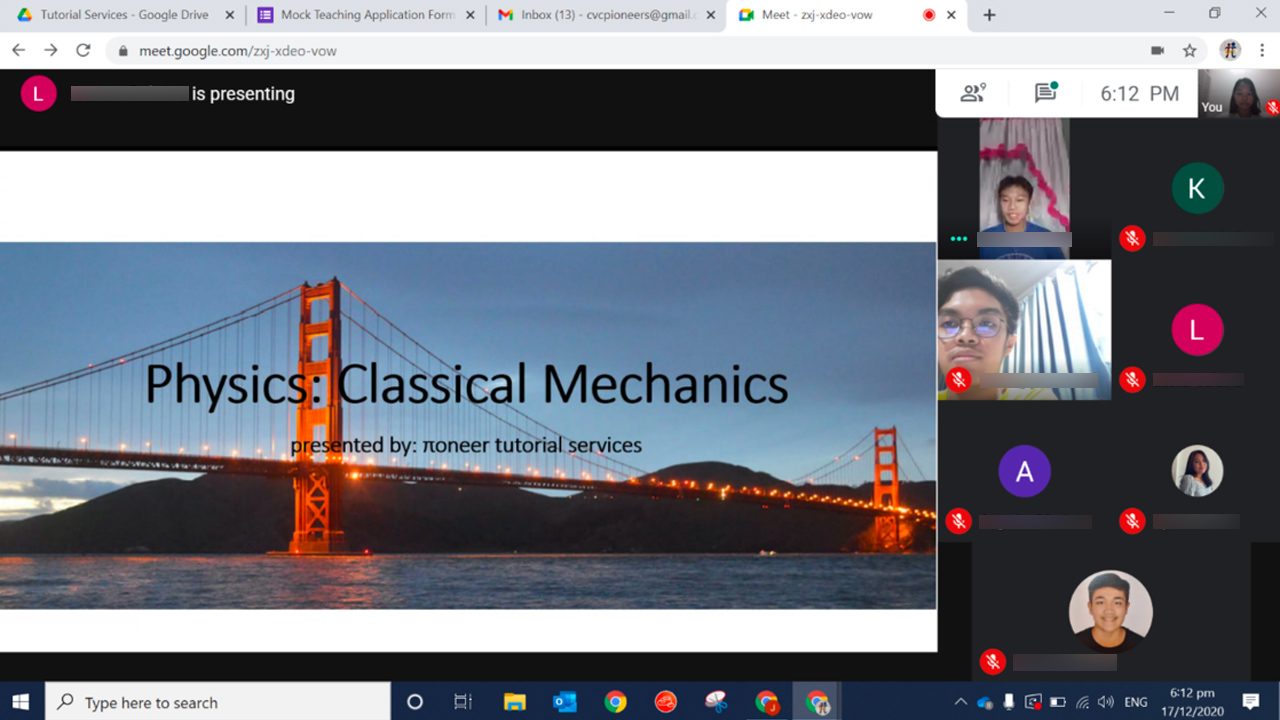SUMMARY
This is AI generated summarization, which may have errors. For context, always refer to the full article.

Hoping to help other students during the pandemic, a group of Philippine Science High School scholars from different campuses has been using their valuable learnings to provide free tutorial services in math and science.
Joanne Micaela Dizo and Edrian Paul Liao, grade 12 students of PSHS-CVC, co-founded the π-oneers (read as pioneers), a youth-run and non-profit group that aims to offer quality STEM (science, technology, engineering, and mathematics) education by providing free aid to high school students in the country.
“Edrian reached out to me last May 2020…. At first I thought [I had] accepted his invite because I [had] some free time…. But later I realized that what I’m most passionate about is [being] able to help anyone in need,” said Dizo, who has received various awards from American and Australian mathematics competitions and the Canadian Senior Mathematics Contest, among others.
With 350 volunteers, the group now offers their services during the pandemic to those who have difficulties in science and mathematics and are still adapting to the “new normal” mode of learning. The volunteers, called ambassadors, tutor students on biology, chemistry, physics, and specific fields of mathematics.
This is a big leap for the group, which started with only 7 members who wanted to help their own schoolmates with their math subjects. Back then, they didn’t have any actual school classes, so it was just a way to continue learning during the pandemic.
“At first I was [skeptical] if I [could] teach a large audience, because back then, I was only used to helping and teaching a few of my friends whenever they [had] difficulties with math. But I decided to take the risk, as I was trying to be more open to opportunities,” said Dizo.
When classes started, the number of students attending online tutorials dropped. Dizo and Liao realized that they were probably not targeting the right clientele and that they were not applying the π-oneers motto – “The limit does not exist” – to themselves.
They then relaunched their advocacy on Facebook, Instagram, and Twitter during Christmas. Now, the group has 84 students benefitting from the group’s online tutorial services.
“What motivated me to pursue this project is my yearning to grow and to be pushed beyond my limits. And with this project, I am thankful that we were able to help students adjust to the new normal setting in our current education system,” Liao said.
The online tutorial services are also the students’ way to help promote science and math, especially after the Philippines’ dismal rankings in a student assessment done by the Organization for Economic Co-operation and Development (OECD) of 15-year-old learners across 79 countries.
Based on the 2018 Programme for International Student Assessment (PISA), the Philippines ranked in the low 70s. Filipino students were low in mathematics and science, earning only 353 points and 357 points, respectively, against a 489 OECD average for both categories.
Lilia Habacon, executive director of the PSHS system, commended Dizo and Liao for starting the initiative and being of service to others.
“This initiative underscores the Filipino youth’s passion to value education and to serve their age group despite having their own struggles in online, distance, or remote learning. By focusing on tutoring others to understand their STEM lessons, π-oneers assist their fellow critical thinkers, increase science literacy, and enable the next generation of innovators to work together in small yet significant ways that can create a ripple effect,” she said.
The two co-founders of π-oneers have big plans ahead of them.
In April 2017, Liao took the Preparatory Scholastic Assessment Test (PSAT) 8/9 and got 1260/1440, a score in the 99th percentile globally. He also belonged in the top 1% of all participants worldwide in the 2016 American Mathematics Competition (AMC 8) – Honor Roll of Distinction.
Liao is now fully enrolled at Duke University, a private research university in Durham, North Carolina, United States, where he plans to study mechanical engineering and pursue a certificate in aerospace engineering and a minor in computer science.
He hopes that his education will help him think up of ways to improve the state of farming in the Philippines. As a son of a farmer, Liao has seen how difficult it is to be one. Climate change has created a negative impact on farming, and farmers still have to endure low incomes.
“With more accurate microsatellites, farmers could be warned of incoming downpours; thermal imaging data and weather pattern analysis could determine what factors can be modified to upscale their harvest and profit from farming,” Liao said.
Dizo, meanwhile, plans to pursue BS Applied Mathematics – Masters in Data Science at Ateneo de Manila University.
As they work toward achieving their dreams, the two students still continue online tutorial services with their group.
For inquiries, interested participants may reach the organization through the following platforms:
Email
Facebook
Twitter
Instagram
LinkedIn
– Rappler.com
Aries N. Oliveros used to teach campus journalism. He loves science and feature writing. He is currently the executive secretary of the executive director of the Philippine Science High School System.
Add a comment
How does this make you feel?
There are no comments yet. Add your comment to start the conversation.